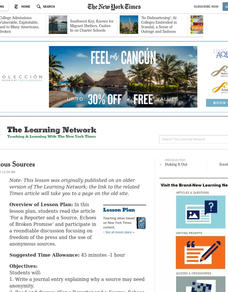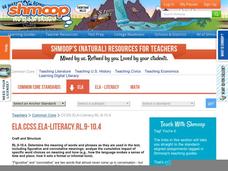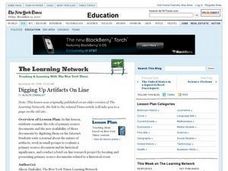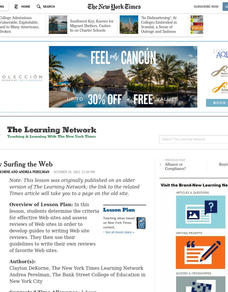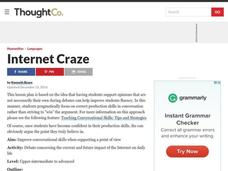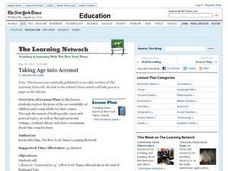Curated OER
Anonymous Sources in the Media
When do people ask for anonymity? Why? After reading the New York Times article "For a Reporter and a Source, Echoes of Broken Promise," young readers participate in a roundtable discussion focusing on freedom of the press and the use of...
Shmoop
ELA.CCSS.ELA-Literacy.RL.9-10.4
The fourth standard for reading literature in the Common Core calls for young readers to be able to determine the figurative and connotative meanings of words and phrases. Use this resource, a continuation of a series of Common Core...
Curated OER
Media Babies
What is a media baby? Discuss at what age children should be exposed to electronic media. After reading an article, they identify the types of media products for infants and toddlers. Learners will predict the effects of media on the...
Scholastic
Analyzing Media Messages
Telling young people to just say no can be difficult in a world that inundates them with messages to just say yes. A instructional activity on media messages encourages teenagers to analyze song lyrics and advertisements that mention...
Lakeshore Learning
Winter Bear Warm-Up
Don't be left out in the cold, ensure young learners are prepared for the winter weather with this clothing activity. After introducing them to different clothing items using the provided picture cards, learners sing a song before...
Curated OER
Picture This! Building Photo-Based Writing Skills
High schoolers analyze photographs as a development activity for their literacy skills. They will review the 6 Q's feature for analyzing photographs and analyze a variety of photographs and then write comments in the space around the...
Media Smarts
Bias in News Sources
As young consumers of media, it is important for high schoolers to explore concepts of bias and prejudice, and how they may be present in media. After discussing ideological messages that media can contain, individuals complete a warm-up...
Curated OER
Beginning Daily Activities Unit
Begin each day with a warm-up that has ELLs focusing their minds on a skill that will be taught that day. Focusing on verbs, each daily lesson reinforces study and self-management skills, helps learners become proficient in working with...
Curated OER
The War of the Words
“Who’s This Guy Dylan Who’s Borrowing Lines From Henry Timrod?” The basic question in this lesson from the New York Time’s Learning Network is whether artists and authors who use the words of others are stealing from that artist or...
Curated OER
A Glimmer of Beauty: Lesson Plan
Fully analyze the elements of art and unexpected beauty in the William Merritt Chase's Still Life with a Fish. The class will examine the painting very closely, then use photography to express unexpected beauty in still life. This is a...
Curated OER
Global Warming: Writing and Editing a Research Report
Bring environmental issues into your classroom! Practice writing and peer editing research reports on global warming and the greenhouse effect. Middle schoolers can work on their research skills, their writing skills, and how to...
Curated OER
Digging Up Artifacts On Line
Why is it important to preserve historical documents and artifacts? Examine the role of primary source documents and the availability of these documents on the Internet. Middle and high schoolers write a journal about the nature of...
Curated OER
Shame on You!
Should public humiliation be an acceptable consequence for a crime? Have your middle schoolers engage in a round table discussion about the recent resurgence of the use of public humiliation as a punishment for crimes in the United...
The New York Times
Crossing the Line Online: Sexual Harassment and Violence in the Age of Social Media - NYTimes.com
Sexual harassment and sexual violence are by no means new issues. What has changed is the role of social media in these issues. This powerful and troubling lesson uses a specific rape case to launch research into a discussion of the...
Curated OER
Cite Your Sites!
The New York Times article “Lessons in Internet Plagiarism,” launches a look at how the Internet has increased the prevalence of plagiarism. The richly detailed lesson plan includes warm-up and wrap-up activities, discussion questions,...
Curated OER
Critically Surfing the Web
The New York Times article “Online Diary,” launches this study of websites and how to assess them. Richly detailed, the lesson includes warm-up activities, procedures, journal prompts, discussion questions, and links to valuable...
Curated OER
How Does Your Garden Grow? Discovering How Weather Patterns Affect Natural Cycles
For the warm-up in this cool climate instructional activity, you will need to click on "Mapping" and then "US Mapping" once you arrive at NOAA's "US Climate at a Glance" page. Earth science explorers realize that 2012 was a warm winter...
Curated OER
Let's Heat Things Up!
Young scholars build and evaluate simple models to understand the greenhouse effect. They explore the role of increased greenhouse gas concentration in global warming, and the implications of global warming theory for engineers,...
PBS
How to Teach Your Students about Fake News
What media literacy skills do people need to evaluate a news source? Scholars listen to and discuss an NPR story about how fake headlines often dupe young people and adults alike. Next, they study news stories, using a fact-checking...
Curated OER
Conversation Lesson: Internet Craze
Learning to support your opinions, debate, build arguments, and effectively respect another's point of view are vital skills. Learners work through a series of topics to practice discussion engagement and verbal communication.
National Wildlife Federation
Quantifying Land Changes Over Time in Areas of Deforestation and Urbanization
Is qualitative or quantitative research more convincing when it comes to climate change? In the eighth lesson during this 21-part series, scholars begin by performing a quantitative analysis of deforestation and urbanization. Then, they...
Curated OER
What Science Suggests About 'Weather Weirding'
Here is an activity that you can use to help upper elementary or middle schoolers to meet Common Core literacy standards for science and technology. Youngsters read the article on extreme weather patterns, "Weather Runs Hot and Cold, So...
Curated OER
Taking Age into Account
Have your class consider the issue of minors' accountability for their crimes. They discuss specific cases and the general issue of juvenile crime in round table discussions. Use this activity to emphasize the rules and individual roles...
Curated OER
Don't Believe the Type: Internet Ethics
What is Internet fraud? Explore Internet ethics and engage in a collaborative discussion. In order to create a Guide to Internet Honesty, learners read and discuss the article "A Beautiful Life, A Tragic Death, a Fraud Exposed." Then...


